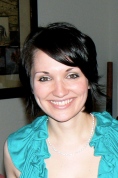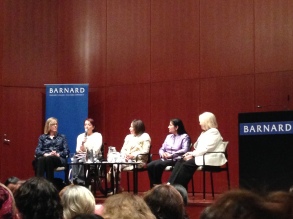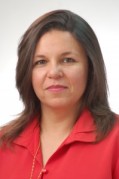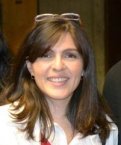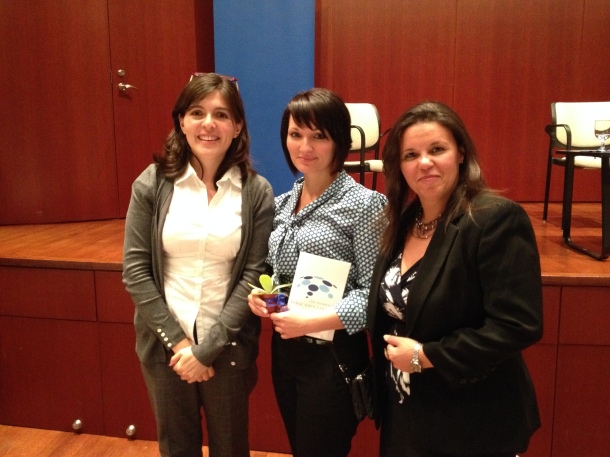Emek Ergun, Satarupa Joardar and Autumn Reed are doctoral candidates in UMBC’s Language, Literacy and Culture (LLC) program and serve on the organizing committee for “Rethinking Intellectual Activism: The 1st Annual LLC Graduate Student Conference,” which will take place at UMBC on April 12, 2014.
Emek describes the conference, and reflects:
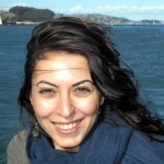 Should scholars be activists? Should they confront and challenge dominant cultures, or safeguard the status quo from the privileged comfort of the ivory tower? We envision “Rethinking Intellectual Activism,” the conference we are working to organize, as a forum for collaborative exploration of these questions. We plan to engage scholars, activists and artists in stimulating conversations about the future of the university as a political place of knowledge production and social justice promotion.
Should scholars be activists? Should they confront and challenge dominant cultures, or safeguard the status quo from the privileged comfort of the ivory tower? We envision “Rethinking Intellectual Activism,” the conference we are working to organize, as a forum for collaborative exploration of these questions. We plan to engage scholars, activists and artists in stimulating conversations about the future of the university as a political place of knowledge production and social justice promotion.
Over the course of my doctoral education, I have had the opportunity to participate in several graduate student conferences across the US. The last time I presented at such an event, at Georgetown University, I came back with an exciting question in my mind: “Why don’t we organize a similar conference at UMBC?” To me, graduate conferences are exciting and comfortable spaces where graduate students in the early stages of their “intellectual” careers can share their research ideas and studies with each other. Since such conferences tend to be relatively small in scale, participants also get a chance to know each other and build networks across disciplines and campuses. If organized well, these events have a great potential to build strong academic, professional, and activist communities. And what better place to achieve this goal than in the interdisciplinary LLC program?
Conversations with colleagues back on campus generated enthusiasm and ideas, and eventually we pulled ourselves together more formally to make such a conference happen here. The open-ended title “Rethinking Intellectual Activism” reflects our desire to bring together graduate students in many disciplines and activists working for social justice on various political fronts. We also want to facilitate many kinds of conversations, and so the conference will feature invited panel discussions, round table sessions, performative works, and art installations. Now, we are enthusiastically waiting for proposals that will contribute to the creation of a critical discursive space wherein to rethink intellectual activism. We hope this will be just the first of many LLC graduate student conferences to come.
Satarupa reflects:
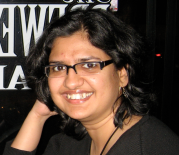 What began as a series of casual conversations among students in the hallways and graduate student offices of the LLC program is now morphing into a promising graduate student conference about broad themes that can impact the intellectual community in different ways. While we are envisioning an academic conference, we are not limiting the dialogue to academics, but including artists and activists and practitioners from various fields so that we can hear many dissenting voices at once. The spirit of interdisciplinarity is writ large on the conference Call for Proposals, and we hope to hear not just from students in the arts, humanities and social sciences programs, but also from those in the sciences and engineering. We want to hear from anybody keen to solve real-world problems through research. It is a lofty ambition to bring together graduate students and others from such broad, far-reaching and diverse backgrounds but as LLC students we are taught to think big and broad, and we are doing just that!
What began as a series of casual conversations among students in the hallways and graduate student offices of the LLC program is now morphing into a promising graduate student conference about broad themes that can impact the intellectual community in different ways. While we are envisioning an academic conference, we are not limiting the dialogue to academics, but including artists and activists and practitioners from various fields so that we can hear many dissenting voices at once. The spirit of interdisciplinarity is writ large on the conference Call for Proposals, and we hope to hear not just from students in the arts, humanities and social sciences programs, but also from those in the sciences and engineering. We want to hear from anybody keen to solve real-world problems through research. It is a lofty ambition to bring together graduate students and others from such broad, far-reaching and diverse backgrounds but as LLC students we are taught to think big and broad, and we are doing just that!
Autumn reflects:
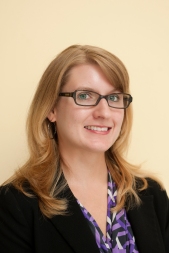 As the Program Coordinator for Faculty Diversity Initiatives and the ADVANCE Program in UMBC’s Office of the Provost and as a Ph.D. candidate in the Language, Literacy, and Culture program, I can tell you that one thing we love to do on campus is plan. Since September 2013, a busy and diverse group of LLC students, including myself, have been meeting about every other week to plan for this inaugural conference. I will be the first to admit that meetings have not always been easy, and opinions have sometimes clashed, but I am proud to report that our process reflects the values of the UMBC community. We listen to and respect one another’s viewpoints, which is the cornerstone of any successful plan. Most important, throughout this planning process, we are engaging in real-world activism, or as my dissertation committee member, Dr. Jodi Kelber-Kaye would say, we are “putting theory into practice.” Because let’s be honest, almost every effective activist project requires a strategic plan (i.e., theoretical grounding) to serve as the guiding principles for the ensuing negotiations between activists about how to get the job done, and done well.
As the Program Coordinator for Faculty Diversity Initiatives and the ADVANCE Program in UMBC’s Office of the Provost and as a Ph.D. candidate in the Language, Literacy, and Culture program, I can tell you that one thing we love to do on campus is plan. Since September 2013, a busy and diverse group of LLC students, including myself, have been meeting about every other week to plan for this inaugural conference. I will be the first to admit that meetings have not always been easy, and opinions have sometimes clashed, but I am proud to report that our process reflects the values of the UMBC community. We listen to and respect one another’s viewpoints, which is the cornerstone of any successful plan. Most important, throughout this planning process, we are engaging in real-world activism, or as my dissertation committee member, Dr. Jodi Kelber-Kaye would say, we are “putting theory into practice.” Because let’s be honest, almost every effective activist project requires a strategic plan (i.e., theoretical grounding) to serve as the guiding principles for the ensuing negotiations between activists about how to get the job done, and done well.
Now, having agreed on a conference date, secured a keynote speaker (LLC alumna Dr. Kaye Whitehead), publicized our call for proposals, set up a conference website, and identified a space for the conference, we plan to just keep on planning. Meanwhile, we hope that you will share our conference with your colleagues, students, and friends, or better yet, send a proposal our way.
Look forward to seeing a lot of you on April 12, 2014. Spread the word!
Contact the authors: Emek Ergun at emekergun@gmail.com; Satarupa Joardar at joardar1@umbc.edu; and Autumn Reed at autumn2@umbc.edu.
